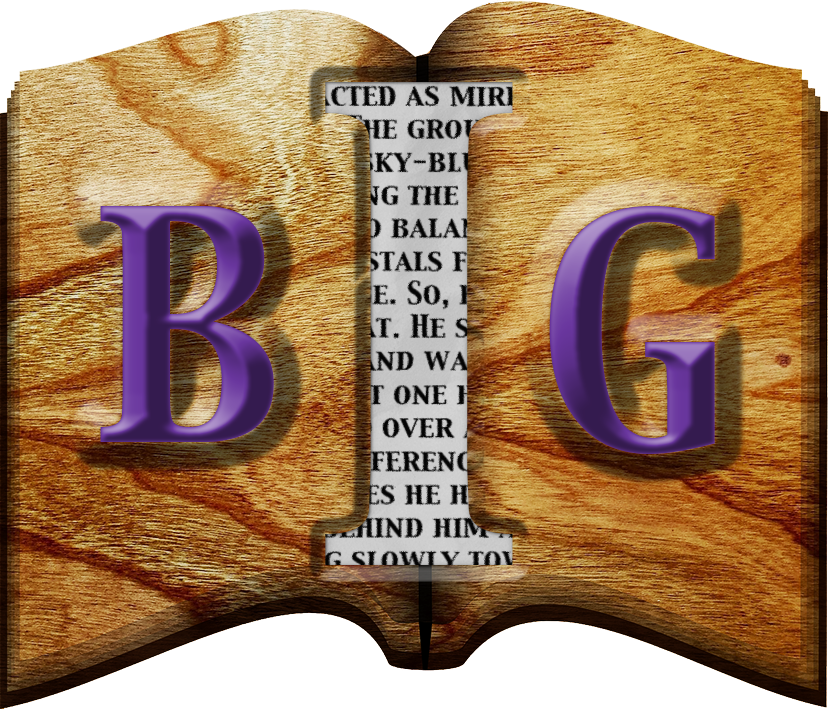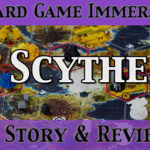At a Glance: Lizard Wizard
Designer: Glenn Drover
Publisher: Forbidden Games
Artists: Jacoby O’Connor, Annie Stegg
Player Count: 2-5
Suggested Age: 10+
Playing Time: 60-90 minutes
Theme: Fantasy, Animals
Mechanics: Set collection, push-your-luck, economy manipulation, auction, push-your-luck
“Do not meddle in the affairs of wizards, for they are subtle and quick to anger.”
– J.R.R. Tolkien, The Fellowship of the Ring
Roadmap
This preview of Lizard Wizard has four parts. First, we have the short story to introduce the theme. Next comes the Short Preview, where various aspects of the game are discussed as per my thoughts and feelings. Next up is the Gameplay Preview, in which the setup and gameplay are discussed in detail, along with initial thoughts. Finally, following the Gameplay Review section, some final thoughts and a final verdict of the game as a whole is given. Feel free to jump around, or read it all in one go. Follow your heart.
Note: I have only played Lizard Wizard on Tabletopia, so all images in this preview are screenshots from those sessions.
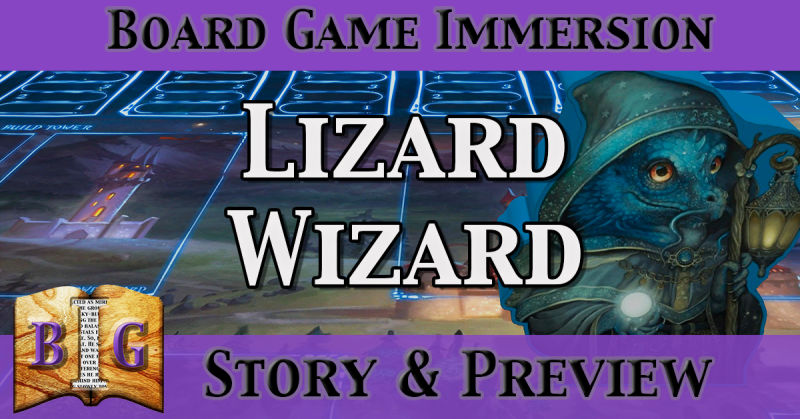
Intro Story: Wizard’s Duel
The dark tower stood in the distance, its flickering light from its height a speck of what it would be up close. Night had just fallen, and there was much to be done. Tolbek, one of the few arch mages left in the land, returned his attention to the present, turning to face the forest. He would need to gather reagents to entice the realm’s wizards to his side.
Tolbek walked into the trees, the darkness enveloping him. He mumbled an incantation and the tip of his walking staff lit up in a faint red light. It wasn’t much, but it was enough to find his path without ruining his night vision. His reptilian eyes were sharp, but they still needed some light in order to see. Red was best for nighttime, anyway.
He was after nightshade this night; only harvested under the proper circumstances would they yield their true powers. He walked quietly—the only noise coming from the insects chirping in the brush. After walking an hour, he knelt down near a clump of flowers. He mumbled another incantation and his light changed to pure white. He shone it down at the flowers. They were purple. He smiled to himself as he retrieved his satchel from his side and began collecting samples of the nightshade, clipping them at the stems with his claws. With his luck of finding some so quickly, he hoped to be back at his tower before the moon fell too far in the sky.
A branch snapped nearby, and Tolbek sprung to his feet, the light on his staff changing back to red with a quick incantation. It wouldn’t do to blind himself if he needed to fight his way out of the forest.
A small dragon—no taller than Tolbek’s shoulder when standing at full height—emerged from the darkness, dark brown cloak casting shadows across its face. “You are not the first arch mage to be spotted this night,” said the wizard in its crackling voice.
“Nor did I assume to be,” Tolbek sighed. He hadn’t assumed to be, but he had hoped. “But come now, you must be after something this night. Perhaps if we worked together, we could both be home before too long.”
“The…others have offered mana in exchange for my service,” the dragon said. “What would you offer me?”
“I have mana stored up at the tower,” Tolbek said. “More than you could possibly imagine.”
“I require proof,” the dragon said, eying the patch of nightshade. “You harvest this?”
Tolbek nodded, although in the dark, he wasn’t sure if the newcomer would notice. “I do. I intend to to convert this batch into power. The time is right for it.”
“It is indeed,” the dragon said softly. “If I aid you, I require a portion of the power.”
“As is to be expected,” Tolbek said cautiously. “What is it you seek in the darkness?”
“Newt. Two eyes of newt, more specifically. I’m working on something…unique.”
“I have a small stash of what you seek at my tower. I have no need for them at this time. They are yours if you come with me.”
The dragon was silent for a moment. “I accept. But if you are lying, arch mage, I will not be as loyal to you as you would wish.”
“I understand,” Tolbek said. “Although you needn’t worry. Come, we must finish clipping these nightshade before we depart.”
For the next two hours, Tolbek and the wizard worked at clipping the nightshade and putting them gently in Tolbek’s satchel. “You work well,” Tolbek said. “You will feel right at home in my tower. Serve me enough, and the tower can be yours.”
“I offered a tower as well,” said a new voice.
Fortunately, Tolbek recognized its owner. He stood up slowly. “Ah, Varkenal. How…unsurprising to find you here.”
“Indeed,” Varkenal said, practically a hiss. “What could you possibly offer this…wizard to earn his loyalty?” He said the word “wizard” with obvious disdain.
“I offered him a portion of the power from our harvest. He is, after all, helping me. And then I will supply him with other reagents that he requires for his studies.”
“I can offer more,” Varkenal said to the wizard. The wizard looked from one arch mage to the other, unsure of what to do.
“You require proof of power,” Tolbek said to the wizard, untying his robe. “Perhaps a duel would suffice.”
Varkenal’s eyes opened wide in surprise, but he quickly regained his composure. “Yes. Yes, that is a good idea. I fine idea indeed.”
“Will you swear fealty to the winner of this duel?” Asked Tolbek.
“I will,” the wizard said. “Only the most powerful can help me with my studies.”
Without waiting for the duel to officially begin, Varkenal attacked. He raised his own staff, pointing it at Tolbek, and a blast of yellow light burst from its tip. Tolbek raised his staff, a blue light pulsing from it. The yellow burst exploded on the blue light. Knowing what would happen with the collision of light, Tolbek had closed his eyes. When the light faded, he opened his eyes to see Varkenal covering his eyes, howling in pain. Or annoyance.
Better make this quick, Tolbek thought.
He slammed his staff into the ground and the earth began to undulate underneath both him and Varkenal. Blinded as he was, Tolbek intended to disorient the arch mage further. Unstable footing would certainly do that. Tolbek walked over to his opponent, but cried out in shock as an invisible pulse caught him and knocked him to the ground.
Varkenal regained his bearing as the ground stopped shaking and glared at Tolbek, his eyes apparently recovered from the bright explosion. Back and forth, the two arch mages sent spell after spell at each other. The dark forest became a stage of flashing lights, the arch mages furiously trying to best the other.
Tolbek took a hit from…something—he didn’t know what—and crashed to the dirt on the forest floor. He looked up to see Varkenal standing over him, staff pointed at his face.
“This won’t hurt much,” Varkenal sneered, “but it will ensure my victory.” With a short incantation, Varkenal pushed his staff closer to Tolbek’s face.
A tiny whips of smoke rose up from the staff. Varkenal looked at the puff of smoke. “Huh.”
Tolbek tapped his staff on the ground next to where he lay, and a mound of earth exploded from underneath Varkenal, sending him sailing over Tolbek and into the dense underbrush.
Tolbek stood up and dusted himself off. “I think that should settle it, then?”
“It does indeed,” said the wizard.
“Good,” said Tolbek. “Let’s get out of here.”
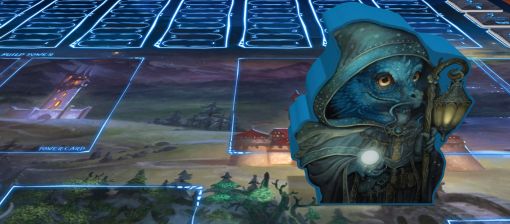
Short Preview: Lizard Wizard
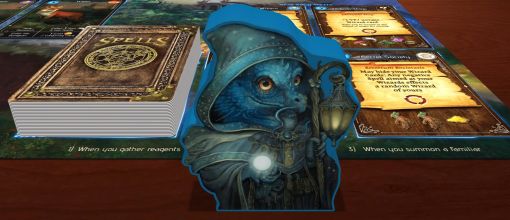
Lizard Wizard is the latest game in the Raccoon Tycoon world. In fact, both games share many similarities. The main difference, however, is that Lizard Wizard is a step up from Raccoon Tycoon in terms of complexity and weight. Some differences in Lizard Wizard include an additional commodity to manage (known as reagents and there are seven of them) and an additional push-your-luck element. The spells also add a nice touch, too.
If you are familiar with Raccoon Tycoon, then you will already know what to expect, for the most part. But, Lizard Wizard’s added depth and complexity do warrant its own game. There is a lot to love about this “heavier” title, so let’s get looking at what those things are.
Immersion
While I will say that I was totally immersed in this game, it wasn’t due to the “story” of the game, but rather the gameplay itself. And, to be completely honest, that works for me. The theme is strong, of that there is no doubt: magic, dragons…you name it. And while the mechanics fit oh-so well with the theme, there isn’t precisely a story that you’re unravelling while you play.
Don’t get me wrong, there is still a narrative and story within the gameplay. It’s just something you have to dig for a bit. Still, everything is so smooth that I still found myself lost in the gameplay (in a good way). There is a lot of narrative possibility in Lizard Wizard; it’s a matter of taking the time to put it all together. All the same, Lizard Wizard is a beautiful and engaging game.
Theme
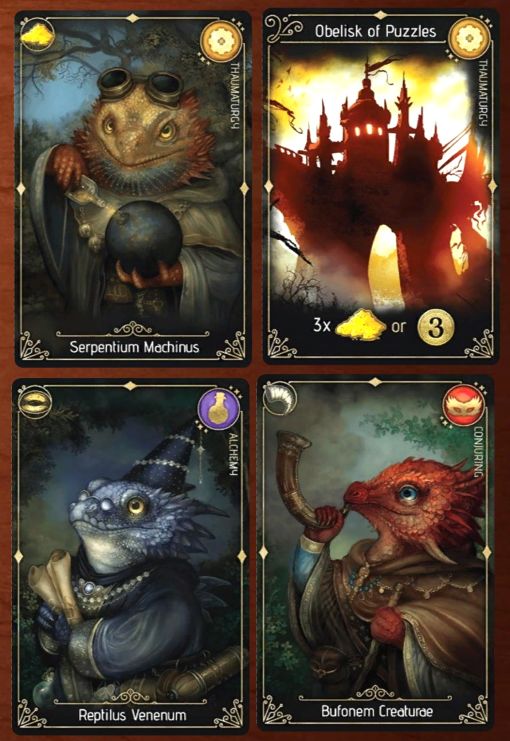
With a fantasy theme featuring dragon wizards, who cares if the game is good or not? Just kidding. I care. But I also am glad there are dragon wizards. Getting to the point, Lizard Wizard has a strong theme, and the artwork does an amazing job at capturing the game’s feeling and tone. Just know that with Lizard Wizard, you’re getting a strong theme (even if the immersion was more due to gameplay than to story).
Components
Ok, so here’s the thing. I did all my Lizard Wizard playing over on Tabletopia. So, I can’t really talk about the component quality at this time. However, everything looks amazing. The shapes of the reagent tokens, the card art, you name it. Forbidden Games puts out high quality games, and I can tell that this will be no exception.
Standout Performances
- Dragons
- Fun theme
- Smooth mechanics
- Easy to learn with a good deal of depth
- Have you seen the art?
Breaking the 4th Wall
In theater, breaking the fourth wall refers to when characters (or something else) directly address the audience, thus pulling them out of the narrative and making the astutely aware that they are, in fact, watching a performance and that’s it’s not actually real.
Solo Mode: Unfortunately, there is no solo mode for Lizard Wizard. It would be the best August-day present someone could give me. But, alas, such is life. The game is great as it is multiplayer; I just want to keep playing when nobody else is available, that’s all.
Double Trouble: Lizard Wizard is closely related to Raccoon Tycoon. That might be a non-issue for some, but it might be a deal breaker for others. Follow your heart on that one.
Gameplay Preview: Lizard Wizard
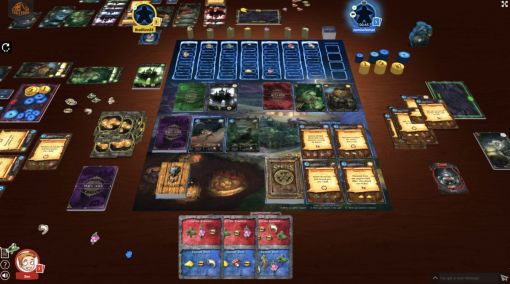
First Impressions of Lizard Wizard
At first, I was all, “Whoa, that’s a lot of stuff.” And then I was all, “That’s still a lot of stuff, but it’s not so overwhelming now that I’ve gone over the rules.” But then I was all, “This isn’t too much stuff. This is just enough stuff.”
If you didn’t quite follow my train of thought (I don’t blame you), at first glance, Lizard Wizard has a lot of different card types, tokens, and other bits. But the rule book was incredibly clear and helpful (huzzah!) and, honestly, I didn’t really struggle to remember what everything was for. It may look like a lot up front, but it’s actually very intuitive.
For my first impressions, you can quote me as saying, “Lizard Wizard is a very good game.” In fact, I kind of love it.
Setup
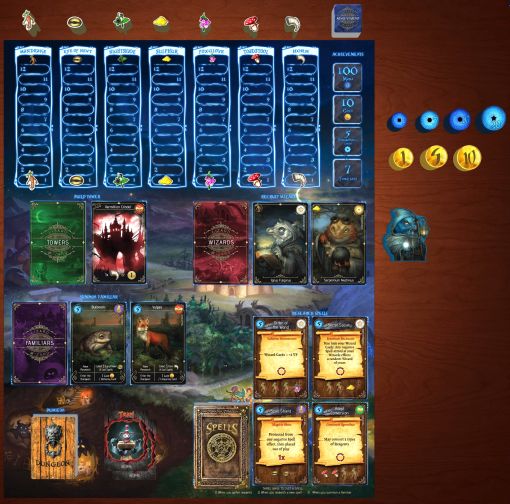
Setup is straightforward and simple, although you may need to remove some cards from each deck depending on player count. Without getting that specific (see the rule book for details), know that you’ll want to separate cards by type, shuffle each type together, and place those decks on their assigned location on the board. Put out one tower (face up), two wizards (face up), four spells (face up), and two familiars (face up). And don’t forget to deal three reagent cards to each player.
Shuffle the dungeon deck (without including the trap cards) and place it on its spot. Then, four achievement tiles are placed on the board. You can get these by being awesome in certain areas of the game. Place one of each reagent token at the lowest mana value on each of their tracks. Place the rest of the reagent tokens—by type—in stacks above their specific track.
Boom. Let’s play.
Thoughts on Setup
Setup is easy peasy. I only really need to reference the rule book to see how many/which cards to remove for different player counts. That’s it. With a bit of help shuffling all the decks, it won’t be long before you’re playing.
Wizard Lizard Gameplay
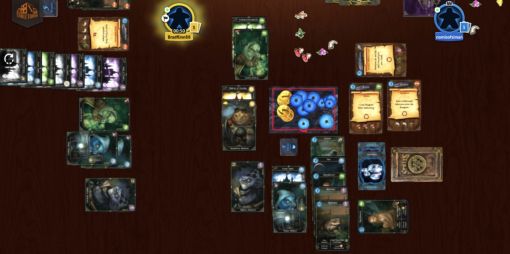
Games consist of rounds and rounds consist of turns. Each round, every player takes one of six actions. After their action is complete, play moves to the next player. The game ends when one of the main decks (tower, wizard, familiar, spell) is depleted. Then, the round is finished (so everyone has the same number of turns), and then points are tallied and the wizardest lizard is crowned!
Points come from towers, wizards, and spell cards, along with gold from familiars and dungeon expeditions, as well as certain spell card abilities. A tower/wizard combo is worth 5 points, but if both the tower and the wizard share the same school of magic, then that combo is worth 10 points instead. And, if you have a wizard/tower combo that matches, each spell card you have cast that also matches that same school of magic gives you an additional 3 points each. Set collection is very important. Do not forget about it.
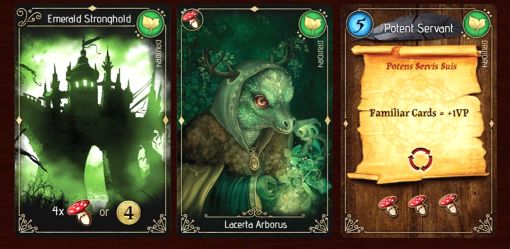
On a turn, the active player may select one of six actions:
1. Gather Reagents
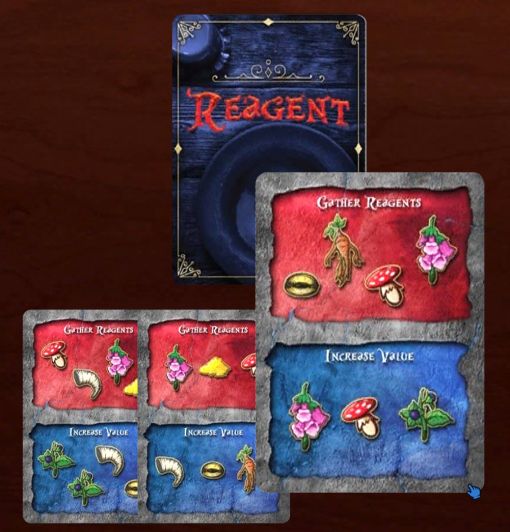
From your hand, you may play a reagent card. If you do, you may select any three of the reagents shown on the card. (Some spells let you collect more.) Then, adjust the commodity/reagent track according to what is shown in the bottom/blue section of the card (move the reagent track up one for each of its symbol).
You may also cast a spell from your hand (or upcast pile of spells) without taking another action. Simply discard the reagents required (as shown on the spell card) and then it’s active. Yay!
2. Convert Reagents
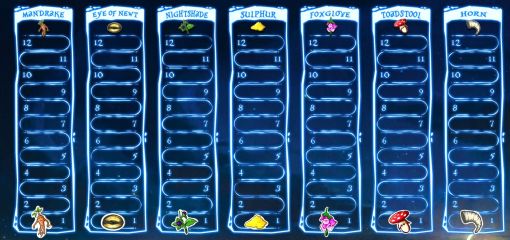
This is essentially selling your personal reagents you’ve already collected for mana. Look at the reagent track (now back at me). You can sell as many of one type of reagent as you wish. In exchange, you get back mana equal to the value that reagent is at on its track for each reagent sold.
So, if shrooms were at 7 on their track, and you sold four of them, you’d make a whopping 28 mana! Excellent!
After selling your reagents, move the reagent track down by the amount of reagents you sold. So, in the above example, I the shroom track would drop down to 3. You got rich and your neighbor, who had six shrooms to sell, is now grump that you dropped their value.
3. Recruit Wizard
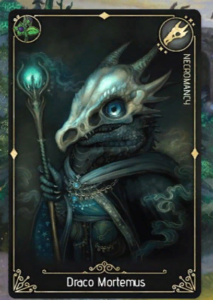
Say there’s a wizard available that you want due to its school of magic. Well, go for it. It’s all yours. Not so fast! I wasn’t finished. It’s all yours after you have a wizard’s duel (see also: bid or auction) for it. This wizard’s duel isn’t like what you see in ye auld The Sword in the Stone or in Harry Potter, but is instead a show of power by spending mana. The more mana you have, the higher you can bid. Simple as that. The bid starts with you, the player whose turn it actually is, and then proceeds clockwise.
Any player who passes is out, and you can only bid as much as you have mana (so no fake outs!). This is a good way to get a wizard on the cheap if you know your opponents are running short on the magical mana, but it’s also a way for your opponents to bid up the cost so you’re stuck paying more than you wanted. But, it’s also a good way to get stuck with a wizard you really don’t want at an exorbitant price. So bid wisely.
But, should you win, you get the lizard wizard and you add it to your tableau. Congrats! You have a new friend.
4. Research Spell
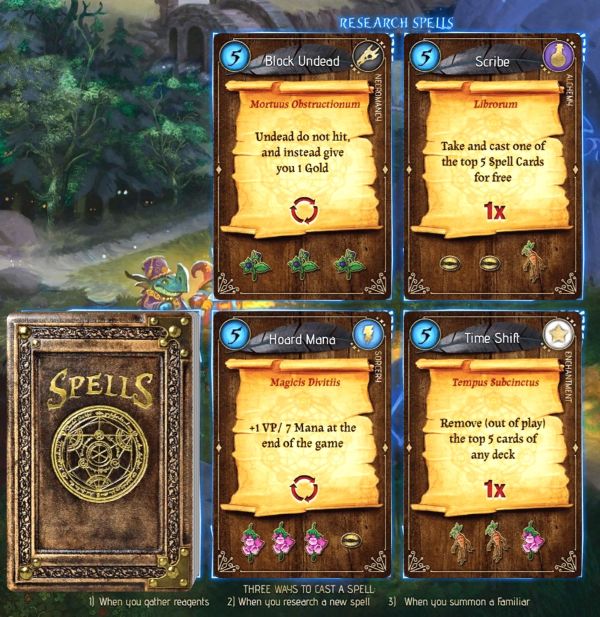
If there’s an available spell you’re itching to have, you can “buy” it (or, more officially, research it) for 5 mana. Then, if you have the required reagents for that particular spell, you may cast it as a free action. Otherwise, you’ll have to wait until later to get its perk.
5. Create a Tower
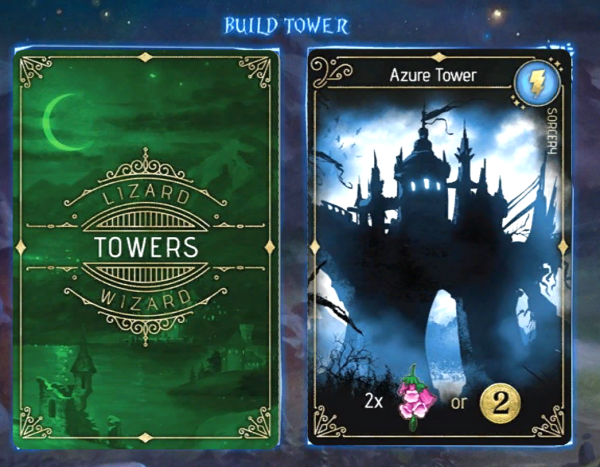
Every wizard needs a tower. So, why not build one? You are, after all, a powerful arch mage. To create a tower, simply spend the resources required (either reagents or gold). Then it’s yours! Or, rather, it’s for your wizard…but you can rent it out. No biggie.
6. Summon a Familiar
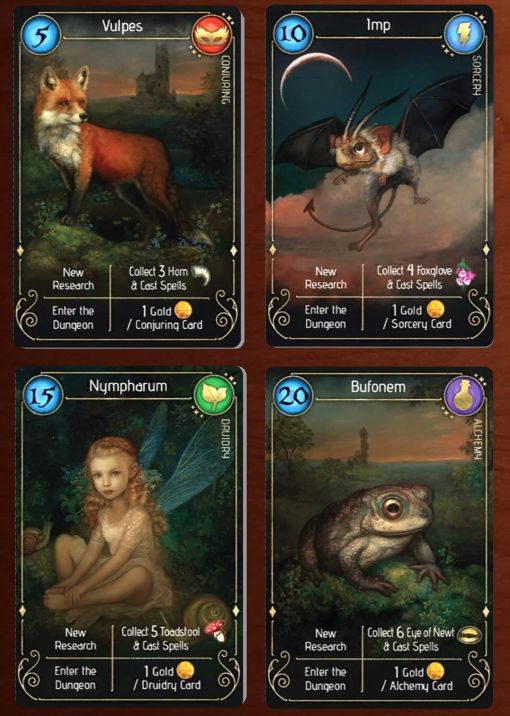
Oh well. At any rate, pay the mana cost for the familiar you want (ranging from 5 to 25). Then, you get the choice of one of four actions.
First, you could score cards. This is done by getting one gold for each card you own that matches the indicated school of magic. Not very ideal early on, but in the late game, you can get a lot of points!
Next, you can gather reagents and cast spells. When gathering reagents in this way, you take what is shown on your newly acquired familiar card. Then, you may cast as many spells as you want (or are able to).
If you really want a spell, however, and the spells available are rubbish, you can elect to clear all the face-up spell cards, reveal four new ones, and take one of those new ones for free. You may not, however, cast this (or any other) spell at this time.
While those are all fun actions and all, my personal favorite is to enter the dungeon. When doing this, simply draw from the dungeon deck. What you’re going for is treasure and gold. If you reveal a monster, you take a hit. You can keep going for as long as you like, but as soon as you take a second hit, you’re done. And, uh, you lose everything you uncovered (it all gets shuffled back into the dungeon deck). If you stop before you take two hits, you keep everything you revealed. Except the monsters; they get shuffled back into the deck. Collecting treasure is important because the player with the most treasure at the end of the game gets 10 points (second most gets 5 points). It’s dangerous, but it can pay off well. Of course, the more people that enter the dungeon (and stop before taking two hits), the more saturated the deck will be with monsters, since those are shuffled back in after every excursion but the treasures are not. I choose this option more often than I should. It’s just so exciting!
That’s it.
There really isn’t anything else to the game. Sure, there are nuances and bidding strategies and “what am I going to do with all these shrooms?” strategies, but the core of the game revolves around those six main actions.
Thoughts on Gameplay
Lizard Wizard plays intuitively well. The various actions play off each other in such a smooth, comfortable way. Wizards, towers, reagents, spells, and familiars are all intertwined to bring you points, mana, and glory.
With just six actions, there are still a lot of choices. And, if someone puts the kibosh on your plans, there’s always something else to do that’s productive. The game is a fun balance of managing resources, getting what you want before your opponents can (if they even want them—you never know these days), and maximizing points through savvy use of set collection.
Final Thoughts on Lizard Wizard
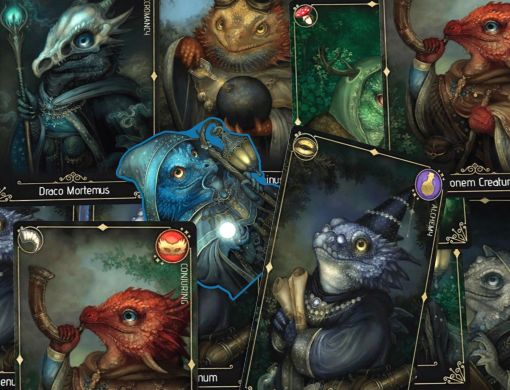
OK fine. I admit, I all kinds of love Lizard Wizard. It’s got what I like: Even without the dragons and fantasy theme, I’d still love this game (I guess I should look into playing Raccoon Tycoon…). But, of course, theme is always an added bonus.
I’m constantly itching to play Lizard Wizard again. And again. And again. And after that? Again, I’m sure. While the narrative journey may not be as engaging as I’d have hoped, that doesn’t change the fact that this game is wonderful.
There is so much to love about Lizard Wizard. The art, the seamlessly smooth mechanics, and the dungeon are, for starters, shining stars in the game.
Lizard Wizard: Final Verdict
Even if you’re a huge Raccoon Tycoon fan, I can see Lizard Wizard taking up shelf space right next to it. I know, I know…I haven’t actually played Raccoon Tycoon yet, but from what I know if it, these games are different enough. For me, anyway. Maybe that will change once I play Raccoon Tycoon; I don’t know. What I do know is that if there is a question as to which one comes into the fold and which one is ousted, I’ll be picking Lizard Wizard. Aside from its fantasy theme, the game is a good level of complexity. And, yes, the fantasy theme does help.
When all is said and done, I’m giving Lizard Wizard a rating of Captivating. Playing the game is an experience in losing yourself in the moment. All I knew that existed was the game and those I played with.
Lizard Wizard is currently on Kickstarter (at the time of this posting) and will wrap up its funding on August 26, 2020. If you like what you see—or would like to see more—visit the campaign!
Verdict Scale (Lowest to Highest)
The Final Verdict is based on a scale of 1-7, although this scale is not numbered. Instead, it uses thematically appropriate words to describe the performance of the game.
Tomatoes – This game was emotionally taxing and difficult to finish.
Uninspiring – This game had me daydreaming about other games.
Lackluster – This game had its moments, but it probably won’t see much table time.
Laodicean – This game is decent. It works. There’s a reason people like it.
Two Thumbs Up – This game is very good
Captivating – This game is outstanding! It’s more than good; it’s practically a staple.
Standing Ovation – This is the best game you will ever play. Period.
Read more short fiction inspired by board games at our stories page!
